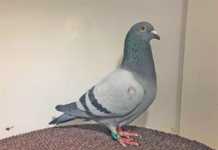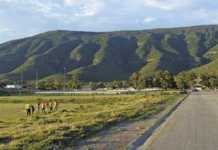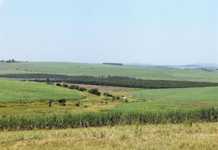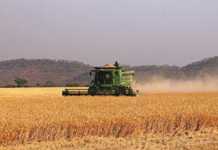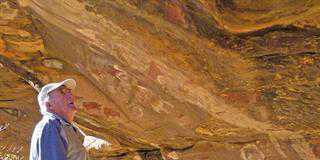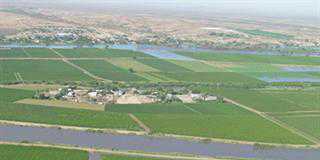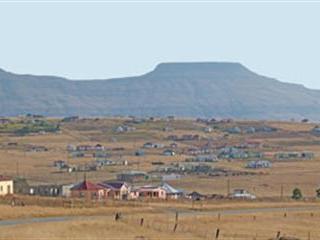
The Tsolo Agriculture and Rural Development Institute (Tardi) near Tsolo in the Eastern Cape helps farmers acquire life improvement skills, says Tardi’s head, Hamilton Mtiyiseli Ntsabo. “The institute is a farmer’s training centre. It has a mandate and a responsibility to ensure that farmers have the capacity to improve their lives,” says Hamilton.
Tardi is on a 900ha farm once home to Tsolo Agricultural College, founded in 1904. The function of the college was redefined in 2000/2001 after the academic programme was suspended, says Hamilton. At that stage the only livestock was in the piggery. Since his initial appointment in 2005, Ntsabo has been responsible for the introduction of about 30 Nguni type cows, 60 bulls (mostly for distribution to communal farmers), 78 Dohne Merinos, 58 pigs and 375 broiler chickens.
The running costs of the institute are covered by the Eastern Cape Department of Rural Development and Agrarian Reform (ECRDAR). However, recent funding packages made available by the national department of agriculture have given Tardi a more powerful boost. In the past two years, the institute has received about R14 million which it has used to improve infrastructure, information and communication technologies and to upgrade the academic qualifications of its staff.
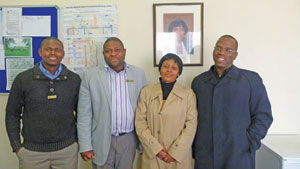
From left: Sivuyile Silinga (chief farm manager), Justice Maluleke (agricultural scientist), Monica Mandyoli (assistant manager, home industries), and Hamilton Ntsabo (head of Tardi).
Targeting excellence
Agricultural scientist, Sabelo Ndlazi, a graduate of the University of Zululand, is currently studying an MSc through the University of Pretoria. On a tour of Tardi’s new seedling tunnel he explains that Tardi aims to produce about 60 000 seedlings a month, focusing on onions, spinach and cabbage, to sell to communal farmers in surrounding areas. There is good demand for cabbage in the region. “Whatever we produce is determined by demand.”
About 4ha of land is set aside for vegetable production demonstrations and 12ha of maize has been planted. Manager of the poultry section, (broilers and layers), Sabelo Kalolo, with a national diploma in animal production from Fort Cox Agricultural College is currently studying animal health through Unisa. Hamilton says the new poultry section entrance is designed to meet modern biosecurity standards.
In charge of the piggery is Donani Ngwandi, an agricultural extension officer who is studying agricultural management at the Nelson Mandela Metropolitan University (NMMU). “There’s a demand for pigs, because of the impact of the 2009 swine fever outbreak,” he explains. “We provide practical training on how to improve standards.” Farm manager Sivuyile Silinga, a Fort Hare graduate, is completing a master’s degree in sustainable agriculture and rural development at the University of the Free State.
Community based
Tardi’s training programmes are based on requests from rural communities that reach the institute via a communal representative committee, says Hamilton. Various practical courses such as wool shearing, classing and mechanisation courses are offered. These are attended by farmers from the Tsolo area, and from areas as far afield as Elliotdale, Bizana, Lusikisiki and Flagstaff.
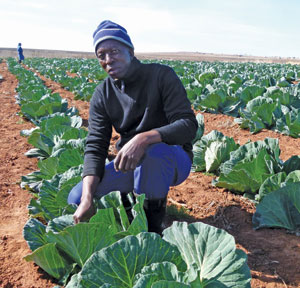
Tembalihle Gova in his cabbage land. His current goal is to transform the 3ha he flood irrigates under a dragline irrigation system.
Accommodation is being revamped for visiting farmers and experiential students who come to Tardi from various institutes for extended stays of between six to 12 months. In 2011, five students from NMMU and one from Tshwane University of Technology visited Tardi. This year, six NMMU students, a Durban University of Technology student and three Unisa students have visited the institute.ECRDAR stores tractors and implements at the institute in anticipation of a dryland cropping initiative – valued at more than R700 million – in the former homelands.
According to Sivuyile, the institute actively supports all government initiatives and programmes. Tardi receives lists of the beneficiaries of government support and aims to involve as many of these beneficiaries in its training programmes as possible.
Feedback
“Tardi has helped me, especially in maize production. I was trained in a mechanisation course at the college. Tardi helps us combine harvest because there’s too much maize to be reaped by hand,” says small-scale farmer, Simphiwe Tshabu. Simphiwe says that Tardi has contributed to his success in achieving 6t/ ha maize yields off 15ha in the 2010/2011 season. Demand for maize in the area is high and he sells most of his crop to retail outlets in Tsolo.
Simphiwe also farms with 44 cows and heifers (bulls are acquired through ECRDAR’s livestock improvement schemes) and 216 Merino ewes. Rams are sourced through the National Wool Growers Association Ram Breeding Project and through commercial farmers. He produces up to eight bales of wool a year. Simphiwe’s livestock operations face two major challenges. The first is stock theft. He has lost 64 sheep and 24 cattle to thieves on two separate occasions.
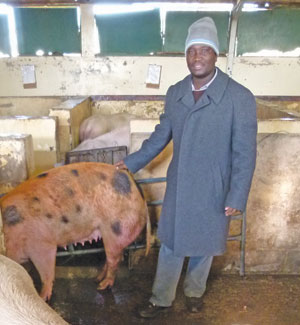
The Tardi piggery will play a role in the revival of pork production in surrounding areas, says piggery manager Donani Ngwandi.
The second is the inability to expand on communal land. “We have land to plant maize and engage in crop production, but we need land for livestock production, because there’s too little land for that here,” he explains. Another farmer supported by Tardi is former government employee Tembalihle Gova, who has farmed full time since 2001. A vegetable grower, Tembalihle produces carrots, spinach, potatoes, green maize and more than 10 000 cabbages a year, on 5ha of leased municipal land, 3ha of which is under irrigation.
Tsolo offers a good market for vegetables, he says. He sells most of his produce to local Spar and Boxer outlets and also to hawkers on the streets of the bustling town. Tardi’s advice on fertiliser selection has proved invaluable to Tembalihle. He is excited about purchasing seedlings from the institute. Currently he is sourcing them from KwaZulu-Natal.
Tembalihle, who employs eight workers, does not believe in group farming, as he says such projects allow for too many passengers who do too little. In his opinion, government should support farmers who are willing to work. When it comes to advice for young farmers, he’s quick to point out that dedication is the key. “You have to be in your lands to see that everything is happening according to plan,” he explains.
Reaching the youth
The Tsolo Agriculture and Rural Development Institute has a schools outreach programme, which involves campaigns at various schools and tours of the Tardi facilities. The programme seems to be working as this year more than 10 grade 12 learners have applied to study at the institute, says agricultural scientist Justice Maluleke.
According to new head Hamilton Ntsabo, the stimulation of interest in agriculture among the youth of the former Transkei is critical as it will help to stop the flow of people from rural to urban areas. “This has a negative impact on the economic status of rural areas,” he says. “We need young energetic people working in communal areas. They migrate to towns and cities where there are no jobs and crime goes up.”
Contact the Tsolo Agriculture and Rural Development Institute on 047 542 0109.

